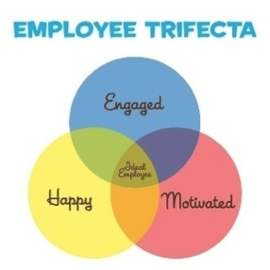New burst of burn-out cases. The rate at which burn-out is wreaking havoc to our workforce is skyrocketing. Close to three million German workers are suffering from burn-out, which is 8% of the entire working population. In Belgium, 21% of workers say their health is at stake due to work-related stress, as reported by the European Agency for Safety and Health at Work. In Flanders, the situation is even worse, with 28,9% employees reporting dangerously high stress levels. In the past few months, the number of burn-out cases has reached an alarming height.
Employees suffering from stress have a remarkably higher risk of suffering from health problems as well. The risk of sleeping problems rises by a factor of 7, while the risk of heart complaints goes up by nearly its five-fold. Anxiety and depression are 8 times more likely in a person under constant stress. When all that’s taken into account, it’s no surprise that stressed out employees have an absenteeism rate that’s twice as high as regular employees. According to many studies, nearly 60% of lost working days originated in an employee collapsing under his or her level of stress.
According to a study of healthcare provider Asklepios 1500 to 3300 workers of each company in the DAX30 are being treated for burn-out at this very moment. In 2013, workplace stress resulting in lost working days, cost the German society as much as 6 billion Euro. In France, the situation is less severe, but the total cost of stress related issues still amounts to 1,5 billion Euro. Throughout the European Union, the average cost of stress is about €2,300 per employee, equaling roughly half a trillion Euro in total. The immense cost that burn-out brings with it, is why many governments of the EU Member States have recently installed laws that obligate companies to prevent the disease and reduce stress at work.
New burst of burn-out cases: Burn-out causes
There are numerous causes that trigger a burn-out. You’ll find the most prevalent ones here, but it’s by no means an exhaustive list.
First and foremost, there’s simply having too much work to handle. Work overload is indeed an important contributor to the risk of having a burn-out, but it’s often misconceived as being the only reason behind a burn-out. In fact, it’s quite the opposite. Having more work than you can handle isn’t always problematic –for some, it’s actually motivating. Look at it this way: you have a ton of work and you’ll never be able to finish it all in time, but your boss praises you for the work you’ve delivered last week and what you do finish is top quality. You know there’s still more work to be done, but you still feel good about it. Only when combined with other factors like being insufficiently rewarded, too much work translates into a burn-out.

New burst of burn-out cases. Rewards are far more than just numbers on your bank account too. Having the feeling that you’re a benefit to the company, its’ employees or customers, certainly is rewarding as well. The same goes for getting recognition from those around you for the work you do.
The impact of your colleagues and managers goes both ways. If you find yourself in a stimulating and supportive workplace, your risk at burn-out will drop significantly. If you however work with people that break you down on a constant basis, the risk logically rises.
The perception of being treated unfairly, is another important cause of burn-out. Unequal pay, praise or promotion often trigger feelings of anger and irritability, which adds up to a general feeling of discomfort at your workplace.
Not being on the same page as your employer value-wise, is detrimental to your stress enduring capabilities as well. If you’re working for an employer whose values conflict with yours, you will find it very hard to still be proud of your work. You either let go of your personal values and feel like you’ve lost touch with yourself, or you deliver work won’t satisfy your manager.
A lack of control, concludes this brief list of burn-out causes. People who are able to manage what they do and when they do it, become rather burn-out resistant. Some organizations don’t offer their employees that kind of flexibility, which leads to feelings of powerlessness, meaninglessness and insecurity, especially when combined with a massive work load.
What can you do to prevent burn-out
New burst of burn-out cases. As an employee you need aware of the signs of an impending burn-out and seeking professional help when necessary. Should you find yourself in an environment that is beneficial to burn-out, you need to convince your employers of the importance of avoiding this contemporary disease, or switch jobs.
Managers and C-level executives can immensely help prevent losing their workforce to burn-out. In order to do so, they have to create a workplace that gives workers recognition when it’s due and one that listens to their opinions and solutions, on all kinds of matter.
According to Gallup, there are three elements that are of extreme importance in burn-out avoidance. Appraisal is one of them, as well as providing workers with the materials they need to deliver high quality work and making their opinions count. Implementing these aspects in the corporate culture drops the number of burn-out afflicted employees by 50%.
Unique approach
New burst of burn-out cases. Resolving the burn-out issue within an organisation requires professional help. Hercules Academy offers both burn-out prevention programs and burn-out treatment programs.
Hercules Academy has cured hundreds of patients in the past years and offers a guaranteed result through a unique holistic approach covering 4 aspects (mental-physical-nutrition-social). Hercules Academy is the only organisation to work with a burn-out protocol and is therefor trusted partner of +50 doctors throughout the country for burn-out treatment. The expertise of the Hercules Academy in this matter was also demonstrated during the first Scientific Symposium on Burn-Out for Doctors in Antwerp end 2015.

The first Academy burn-out program focuses on prevention, creating awareness of the risks and causes of burn-out, as well highlighting the signs of an imminent burn-out with different personality tests, measurement of energy levels, etc.
The other burn-out programs have a curative aspect and rely on an employee-employer-professional coach trifecta. The programs are supported by appointed physicians, nutritionists and psychologists and result in a quick recovery and reintegration in the organisation.
We believe that the best guarantee for a successful burn-out treatment is to have a helicopter of both the private and working life of the employee, as the causes are rooted in a combination of these two aspects in life. It is exactly our experience in combined fields like psycho-energetics, sports, psychology, health and HR, that our approach has been very effective with zero cases of relapse among our patients until now.
Does your organisation struggle to fight an increasing number of burn-out cases?
Do you want to give a wake-up call to your management?
Do you want an information session on burn-out for your organisation?
Are you currently suffering from burn-out?
Are you an HR professional who doesn’t know where to start?
Contact us on info@hercules-academy.com for expert advice and burn-out first aid.
